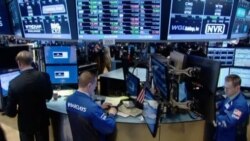The U.S. economy grew at an annual rate of 5 percent during the July-to-September quarter, the fastest since 2003, the Commerce Department reported Tuesday.
The growth in gross domestic product was fueled in part by consumer and business spending. Analysts said it wasn't a blip, but rather a sign of things to come in 2015.
Brad McMillan of Commonwealth Financial Network told VOA that the growth rate "says that we are actually getting very close, I would not say to a boom, but we have a sustainable recovery and it is accelerating.”
A separate measure of consumer sentiment by the Gallup polling agency showed economic confidence at its highest level in 2014. Confident consumers are more likely to spend money, and their purchases drive most U.S. economic activity.
The economic news encouraged investors on Wall Street. The Dow Jones industrial average rose above 18,000 for the first time.
Gross domestic product, the sum of all goods and services produced in the country, is the broadest measure of economic health. And in a country as consumer-driven as the United States is, said Barclays Capital chief economist Michael Gapen, the fiscal third-quarter GDP number shows it's time for business to catch up.
"Two-thirds of the U.S. economy is related to consumption, and history would suggest that business investment lags consumption or lags economic growth," he said. "So if the overall economy is starting to accelerate, then 2015 could also be a fairly strong business climate."
But external factors could still have an impact on the U.S. economy. Among them are reduced revenue in oil-producing countries and slower growth in others, according to Bankrate.com analyst Claes Bell.
“I would say that there are some modest headwinds on the economy," Bell said. "A lot of our trading partners are seeing their economic growth slow a lot, so our export growth may not be what it was earlier this year.”
Faster U.S. growth could also lead to higher prices. That means higher inflation, said Commonwealth Financial’s McMillan.
“First of all, wage growth is going to accelerate, and in fact we’re already seeing that," he said. "Second of all, owner-equivalent rent — the cost of housing — is a very large part of the inflation index, and that’s actually rising faster than people realize.”
U.S. inflation has been well below the U.S. Federal Reserve's target rate of 2 percent. But some say better-than-expected growth and increased consumer spending could prompt the central bank to raise interest rates sooner than the mid-2015 time frame economists have predicted.
The Federal Reserve said it would be "patient" in evaluating new economic data.





